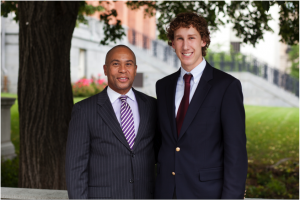By Sam Livingston ’14
This is the first installment of a two part piece on Sam’s summer internship. Please check back tomorrow for Part II.
This past summer I interned in the Office of Massachusetts Governor Deval Patrick, working with the Judicial Nominating Commission (JNC) at the State House on Beacon Hill in Boston. While working in the executive branch of state government is less glamorous and more demanding than I first thought, I had a very rewarding experience and the internship complemented my Public Policy & Law major in both expected and unexpected ways. The State House is a magnet for voters to express their wishes and every day something different happens. For instance, one morning there was a traffic jam caused by people who had chained their wheelchairs together across Beacon Street to protest a hike in subway and bus fares, another time I had to walk by a gauntlet of reporters videotaping everyone to find which legislators ands staff were coming to work on time, and I even had to try to ignore angry outbursts at the weekly Governor’s Council meeting debating the merits of judicial nominees. I had a great opportunity to learn about the judicial selection process as well as State House politics.
I worked in the West Wing of the State House in the executive offices. Not only is the Governor’s impressive suite located in the West Wing, but also the offices of legislative leaders. The JNC has a humble location in the basement, crowded with file cabinets. We appreciated being hard to find because of the sensitive nature of our work.
Massachusetts has a unique system for determining judgeships. Judges in all the state’s courts are appointed by the Governor, with the advice and consent of the Governor’s Council. The Council dates back to colonial times and consists of eight elected representatives from the different districts of the state. It is independent and serves as a check on the Governor. Once appointed, judges serve “for life” with mandatory retirement at the age 70. This kind of lifetime appointment is extremely rare in judicial selection across all states.
The JNC assists the Governor by accepting and reviewing applications from lawyers wanting to be judges, as well as judges seeking appointment to a different court. The JNC recommends to the governor applicants it believes would best serve the Commonwealth on the bench. The JNC consists of approximately 23 Massachusetts lawyers and some non-lawyers appointed by the governor. It meets once a week for several hours in the evening at a downtown law firm.
The entire process takes about seven to nine months and an applicant can be rejected at any time in the process. The members use a careful system ensuring full and fair consideration of each applicant. First, they conduct a blind review of an applicant’s credentials, and then they will personally interview the best candidates to more fully understand their personality and motivation (Both judicial demeanor and a sense of fairness are important). Finally, when a positive vote is taken to recommend an applicant, they will conduct lengthy due diligence. They will not only call an applicant’s references but will also call other people associated with the applicant, such as co-workers or even opposing attorneys from an applicant’s cases from the applicant. Tax records and criminal records are also checked. If an applicant makes it through this highly selective process, the JNC recommends the applicant to the Governor by putting their name on a slate with other applicants. The Governor then chooses from the slate with advice from his chief legal counsel.

